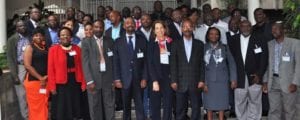The African Water Facility (AWF), with the support of the African Development Bank’s (AfDB) East Africa Regional Resource Center, brought together more than 40 project managers from over 15 English-speaking African countries to participate in a five-day project management training in Nairobi earlier this month.
The workshop was designed to increasing AWF grantees’ capacity to navigate through the AfDB and AWF rules and procedures, as well as to help enhance their ability to manage various administrative aspects of their projects, thereby maximizing results on the ground and benefits to targeted populations. “The African Water Facility has committed itself to working closely with its grantees to help them overcome the challenges of project management and implementation,” said Akissa Bahri, Coordinator of the AWF. “Enhanced familiarity with our project management rules, as well as knowledge sharing and capacity building are of tremendous value to our grantees and can significantly increase the success of their projects in the short and long term.” At the workshop opening, Gabriel Negatu, Director of the AfDB’s East Africa Regional Resource Center, acknowledged AWF’s role in identifying and financing preparation of projects, particularly those involving complex, niche or innovative approaches and the increasing number in the AWF portfolio in the region. He encouraged participants to use the workshop as an opportunity to address bottlenecks affecting implementation which lead to start up delays. He emphasised the need to ensure project delivery is done in a timely manner to enable faster achievement of intended benefits and avoid cancellation of funds.The workshop The workshop was designed to:
- enhance the knowledge of the project management team members on the rules and procedures of the AfDB and the AWF in administrative, technical and financial management of projects
- review the constraints and difficulties encountered in the implementation of projects
- review the terms of distilling and documentation of lessons learned and knowledge products
- foster discussions among project management team members and exchange experiences to make the appropriate recommendations to improve procedures for monitoring and supervision of projects’ reporting to the AWF.








